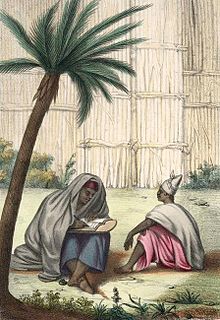
Back تكرور Arabic Toucouleur AST Тукулёр Byelorussian Toukouleured Breton Tuculor Catalan Tukulor German Tukuloroj Esperanto Tucolor Spanish توکولورها Persian Tukulorit Finnish
Haalpulaar هَالْݒُلَارْ 𞤖𞤢𞥄𞤤𞤨𞤵𞤤𞤢𞥄𞤪 | |
|---|---|
 A Tukulor man and woman (1853 David Boilat painting) | |
| Total population | |
| 1 million (2010)[1] | |
| Regions with significant populations | |
| Senegal The Gambia Mali Mauritania | |
| Languages | |
| Pulaar and French | |
| Religion | |
| Islam | |
| Related ethnic groups | |
| Serer, Wolof, Fula |
The Toucouleur people or Tukulor people (Arabic: توكولور, French: Toucouleur), also called Haalpulaar (Ajami: هَالْݒُلَارْ, Adlam: 𞤖𞤢𞥄𞤤𞤨𞤵𞤤𞤢𞥄𞤪), are a West African ethnic group native to the Futa Toro region of Senegal. There are smaller communities in Mali and Mauritania.[1] The Toucouleur were Islamized in the 11th century; their early and strong Islamic heritage, which is seen as a defining feature, is a "matter of great pride for them".[1][2] They were among the first Muslims in the area that became Senegal.[3] They were influential in the spread of Islam to West Africa in the medieval era.
They founded the vast Toucouleur Empire in the 19th century under Omar Saidou Tall who led a religious war against the neighboring ethnic groups and the French colonial forces.[2][4]
The Toucouleur are traditionally sedentary, settled primarily in the Senegal River valley, with farming, fishing and raising cattle as their main activities. The Toucouleur society has been patrilineal, polygynous and with high social stratification that included slavery and caste system.[1][2][5] There are an estimated 1 million Toucouleur people in West Africa.[1]
- ^ a b c d e Anthony Appiah; Henry Louis Gates (2010). Encyclopedia of Africa. Oxford University Press. pp. 500–501. ISBN 978-0-19-533770-9.
- ^ a b c Tukulor, Encyclopædia Britannica
- ^ Trillo, Richard; Hudgens, Jim (November 1995). West Africa: The Rough Guide. Rough Guides (2nd ed.). London: The Rough Guides. p. 144. ISBN 978-1-85828-101-8.
- ^ Wendy Doniger (1999). Merriam-Webster's Encyclopedia of World Religions. Merriam-Webster. p. 1116. ISBN 978-0-87779-044-0.
- ^ Tal Tamari (1991). "The Development of Caste Systems in West Africa". The Journal of African History. 32 (2). Cambridge University Press: 221–250. doi:10.1017/s0021853700025718. JSTOR 182616. S2CID 162509491., Quote: "Endogamous artisan and musician groups are characteristic of over fifteen West African peoples, including the Manding, Soninke, Wolof, Serer, Fulani, Tukulor, Songhay, Dogon, Senufo, Minianka, Moors, and Tuareg."
© MMXXIII Rich X Search. We shall prevail. All rights reserved. Rich X Search